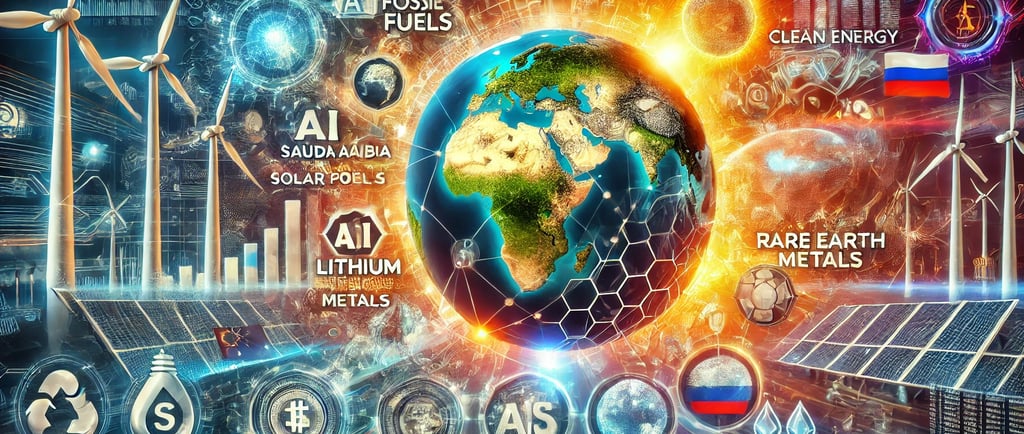The Decline of Oil Giants
For decades, oil-rich nations like Saudi Arabia, Russia, UAE, and Venezuela have funded their governments through massive fossil fuel exports. But as renewables and electrification take over, these economies face a reckoning.
Fossil Fuel Dependency vs. Economic Risk
Saudi Arabia (80% of revenue from oil) → Economic collapse risk if not diversified.
Russia (40%) → Losing leverage as Europe moves to green energy.
Venezuela (98%) → Could face humanitarian crises.
Some, like Saudi Arabia, are trying to pivot with projects like NEOM and Vision 2030, investing in tourism, tech, and solar power. But for others, the fall could be harsh.
The Rise of Clean Energy Superpowers
As fossil fuels decline, a new group of nations is rising to dominate clean energy, battery technology, and AI-driven grids.
Top Renewable Energy Leaders by Investment (2024-2035)
China → Already controls 80% of global solar panel production and dominates battery tech.
USA → Pushing AI-driven energy grids, nuclear fusion, and EV markets.
EU & Nordic Countries → Leaders in offshore wind and hydrogen energy.
India → Becoming a green hydrogen superpower.
New Resources, New Powers
While oil loses value, lithium, cobalt, nickel, and rare earth metals are becoming the new gold. These resources power EVs, solar batteries, and AI-driven energy grids.
Key Metal Reserves & Production by Country
Lithium (Chile, Australia, Argentina) → Essential for EV batteries.
Cobalt (Congo) → A crucial resource, but mining concerns remain.
Rare Earth Metals (China) → 60% of global production, giving China an energy tech monopoly.
This shift means resource-rich African and Latin American nations could gain power in the clean energy race.
Decentralized Energy & AI Take Over
The future isn’t just about which countries have resources—it’s about who controls the technology behind energy distribution. AI-driven smart grids, blockchain-based energy trading, and decentralized solar power will reduce dependence on big oil corporations.
Tesla, Google, and Microsoft are already investing in AI-powered energy grids.
Blockchain energy trading will let individuals buy and sell power like stocks.
Solar + Battery Storage means even small communities can be energy independent.
🌍 Winners & Losers in the AI Energy Era
🚀 Countries That Will Benefit (Winners)
These nations are investing heavily in renewables, AI energy management, and battery storage, ensuring long-term economic growth:
✅ USA – Leading AI startups, Tesla, Google’s DeepMind (energy optimization)
✅ China – Dominating battery production, AI grid management, and solar panel manufacturing
✅ EU (Germany, France, Netherlands) – Advanced AI-driven smart grids and green hydrogen projects
✅ India – Scaling up AI-driven solar and wind farms, reducing dependency on coal
⚠️ Countries at Risk (Losers)
These nations rely heavily on fossil fuel exports and risk economic downturns if they don’t adapt:
❌ Saudi Arabia – 42% GDP from oil; slow diversification despite Vision 2030
❌ Russia – Fossil fuels make up 35% of GDP; weak AI and renewable investments
❌ Venezuela – 98% dependency on oil; struggling economy, limited AI initiatives
❌ Nigeria – Heavy reliance on oil exports; limited infrastructure for AI energy transition
Geopolitical & Military Shifts
With oil losing importance, military priorities will shift:
Middle East interventions may decline, reducing Western military presence.
Resource-rich Africa & Latin America will gain influence in global politics.
U.S.-China tensions could escalate over battery resources instead of oil.
🛠️ The Path Forward: Adapt or Decline
1️⃣ Invest in AI-powered energy grids – Optimize power distribution, reduce waste
2️⃣ Develop large-scale battery storage – Countries with strong lithium reserves will dominate
3️⃣ Shift from oil exports to energy tech exports – AI-powered renewables can replace lost revenues
Conclusion: The Future Belongs to the Adaptable
The post-fossil fuel world is already taking shape. Countries that adapt and lead in clean energy, AI, and battery tech will thrive. Those stuck in oil dependency will struggle.
As power shifts, the question is: Who will shape the new era of energy?


